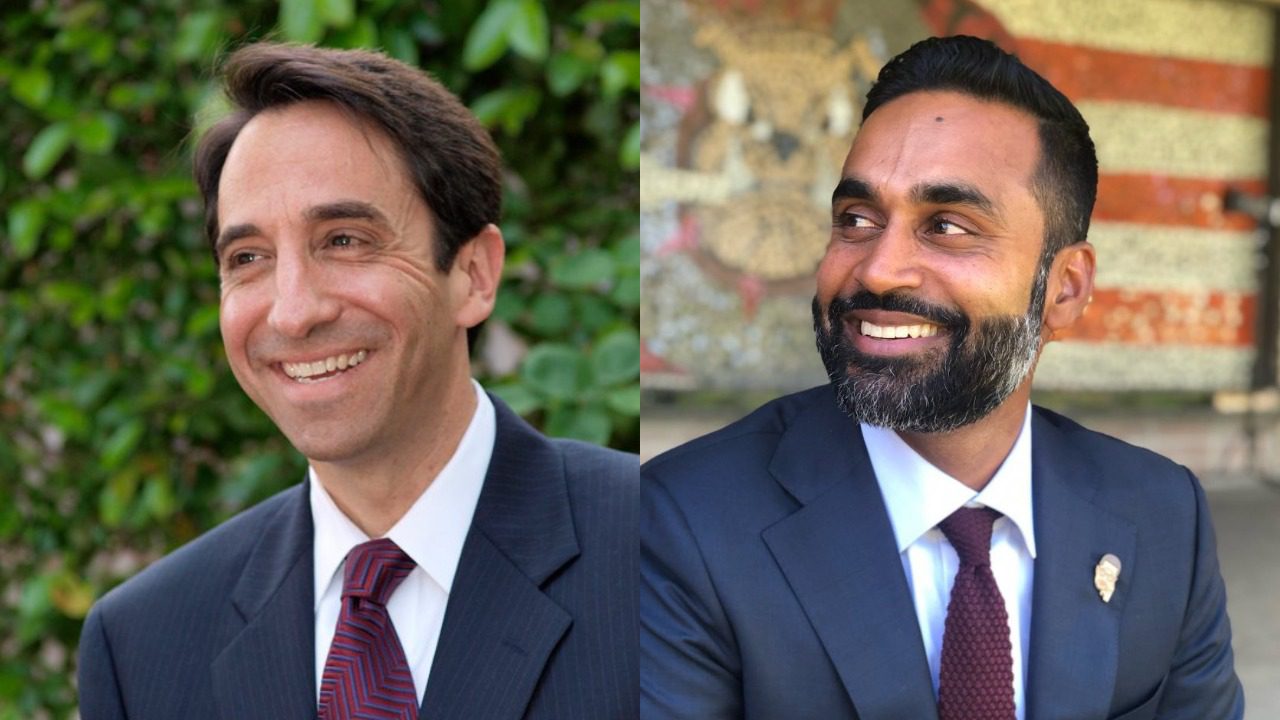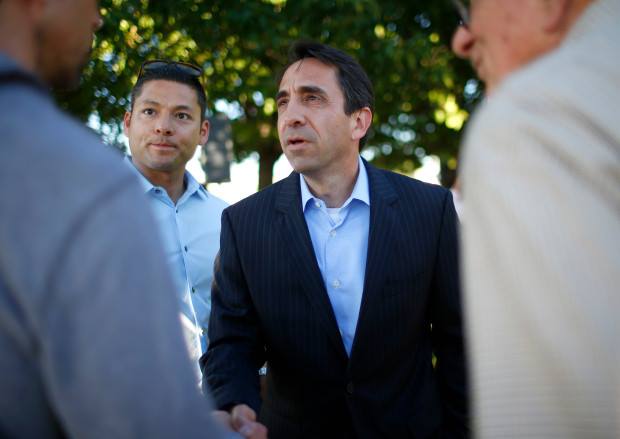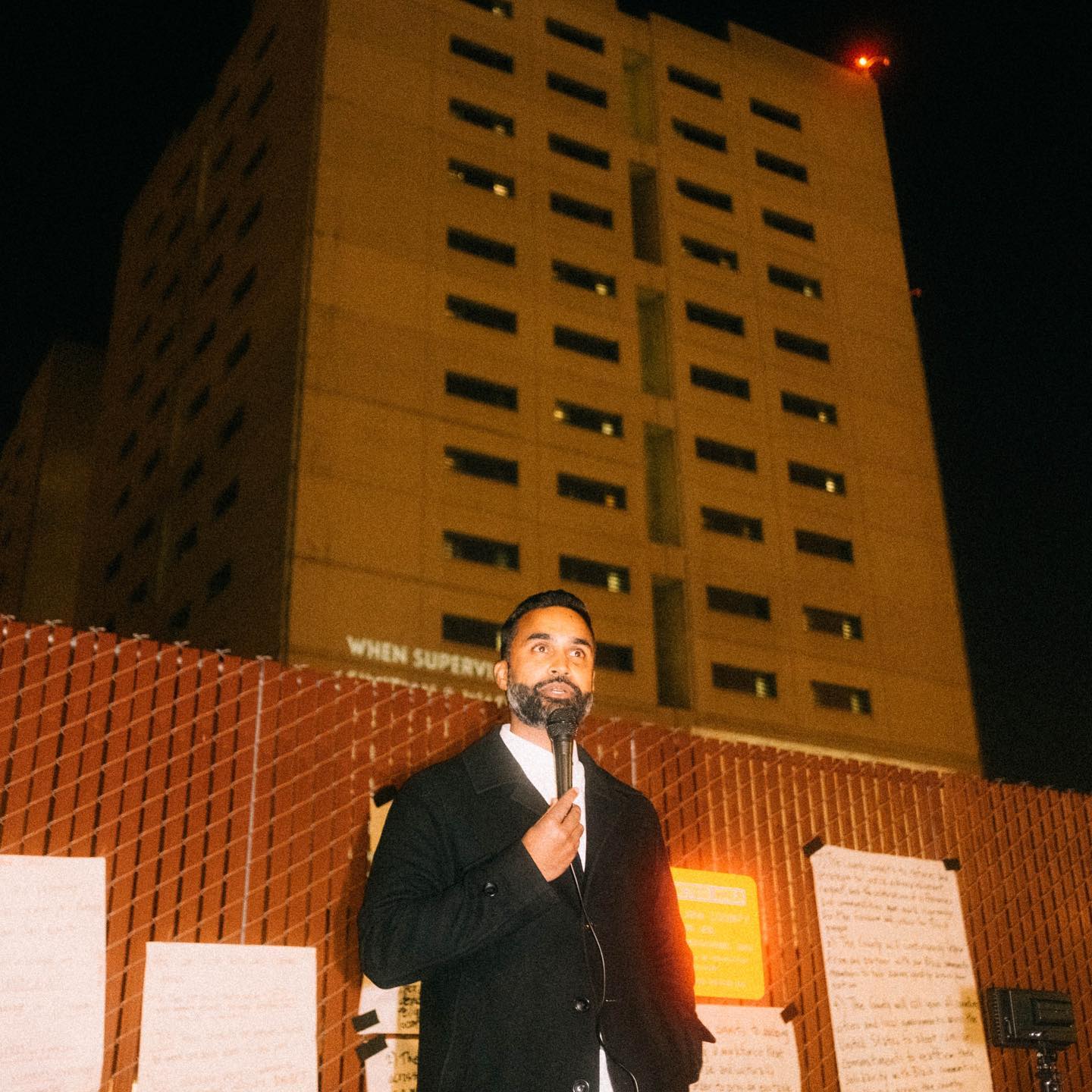Longstanding Grievances Between Prosecutor and Public Defender Boil Over in California DA Race
The election in Santa Clara County captures mounting tensions in California over what counts as meaningful criminal justice reform
| February 10, 2022

Public defender Sajid Khan still remembers watching his fourteen-year-old client walk into court in California’s Santa Clara County, laden with shackles around his waist, wrists, and ankles. It was 2015, and Christian Haro Cotero was being charged as an adult for stabbing an older boy who’d threatened him. He had confessed without an attorney or his mother present, and prosecutors were seeking steeper punishment over a gang affiliation. Khan had urged prosecutors to keep Christian’s case in juvenile court. He detailed the abuse Christian had suffered at the hands of his father, and the resulting depression and suicidal ideation that had plagued him since childhood. But District Attorney Jeff Rosen’s office refused.
“It was just viscerally, emotionally, professionally, one of the most jarring experiences of my career,” Khan told Bolts. The DA’s office, he said, “insisted that this 14-year-old child who had a serious history of trauma, but had also manifested a significant display of potential for rehabilitation—they insisted that he suffer an adult felony conviction, that he suffer a prison sentence.” In court, he said, Christian was very quiet. He seemed bewildered by the legal proceedings.
After Christian pled guilty and was sent to prison, Khan and Rosen moved their showdown into the legislative sphere. In 2018, they argued on opposite sides of a measure to ban the prosecution of children under age 16 as adults, a frequent practice under Rosen at the time. When the California legislature passed Senate Bill 1391 in 2018, Rosen joined a lawsuit attempting to strike it down, though the effort failed. Veronica Haro, Christian’s mother, advocated fiercely on behalf of Senate Bill 1391 “so that other families wouldn’t have to go through what my son went through,” she told Bolts in Spanish. The bill’s adoption, she said, “was huge for me. I knew it wasn’t going to help my son, but it would help other young people.”
With Rosen up for reelection this year, the fight has moved to the ballot box: Khan is now running against the incumbent DA.
Youth justice remains a key component of Khan’s critique of Rosen, whose office has continued to charge some 16- and 17-year-olds as adults—a policy that Khan says he would end outright. “The DA has the power, right now, to stop prosecuting kids as adults, … to stop pursuing life sentences against youthful offenders,” Khan told Bolts.
But Khan, who works in Santa Clara County’s Alternate Defender office, has long called for changing the norms and practices of prosecution far beyond youth sentencing. “We should fire our very righteous outrage, fury and ire at District Attorney’s [sic] offices too,” he wrote in a blog post published in 2020, at the height of the Black Lives Matter protests, that condemned prosecutors’ role in furthering systemic racism. Rosen replied to that post by accusing Khan of threatening violence against his office and filing a formal complaint, which he later retracted.
Beyond the two candidates’ contentious public relationship, their race underscores a larger debate over what DAs should do to curtail mass incarceration. The race has already revealed growing rifts within the reform community about what constitutes meaningful criminal justice reform in the Black Lives Matter era.
Rosen, who was first elected DA in 2010 and has never faced an opponent since, also casts himself as a reformer. He is quick to cite a series of accomplishments, including a major legislative measure adopted in 2019 that created a new mechanism to release people from prison by empowering DAs to review their sentences. Rosen now enjoys the endorsement of Hillary Blout, a prominent reformer who spearheaded that law. (Blout declined an interview for this piece.)
Rosen has also broken with the old guard of tough-on-crime prosecutors on other occasions. In 2014, he was one of just three California DAs to support Proposition 47, a successful ballot initiative that reduced sentencing for some lower-level offenses. In 2019, he invoked a public health approach to drug use, announcing he would prosecute fewer simple possession cases. But Rosen has also proven a fierce opponent of some of the state’s milestone sentencing reforms, such as the law that banned the adult prosecution of children under 16 and another major reform adopted in 2018 that narrowed California’s felony murder statutes. He long drew fire from progressives for seeking the death penalty, though he announced in 2020 that he would no longer do so.
As more DA candidates across the nation don the mantle of the “progressive prosecutor,” the expectations for those who claim that label have also risen. “We’ve seen a tremendous sea change over the last five years in what it means to be an elected prosecutor,” said Miriam Krinsky, the California-based executive director of Fair and Just Prosecution, an organization that promotes criminal justice reform through DA offices.
Khan has criticized the “squishy” standards that allow many DAs to dub themselves “progressive prosecutors.” He co-wrote a law review article grousing, “Any person prepared to say, ‘We need to be smart on crime,’ can claim to be a card-carrying member.” He told Bolts that the Santa Clara DA’s office needs to spearhead “drastic, transformational change,” calling for a slate of policy upheavals that Rosen has thus far resisted.
Rosen declined requests for an interview. “DA Jeff Rosen is a nationally recognized leader in criminal justice reform that works,” said Leo Briones, his longtime political advisor. Rosen and Khan are running alongside former Santa Clara prosecutor Daniel Chung in the nonpartisan June primary (if none of them receive more than 50 percent of the vote, the top two finishers will move to a November runoff). Like Khan, Chung says that Rosen sought to punish him over a piece of public writing, though Chung is criticizing the incumbent from the opposite direction. Chung claims he was demoted and later fired by Rosen for writing an article that criticized sentencing reforms proposed in California, on the grounds that they risked exacerbating anti-Asian violence. Chung, who did not respond to a request for comment about his critiques of Rosen, has accused the DA of posturing as a progressive to get the governor to appoint him as California’s attorney general last year. “DA Rosen has had his finger to the wind, disingenuously pivoting himself to be perceived as a progressive prosecutor,” he wrote in a local outlet.
Jon Grobman first met Rosen when the DA attended a criminal justice reform symposium at California State Prison in Lancaster, back when Grobman was still serving six consecutive life sentences for a nonviolent drug-related robbery. Believing he would die in prison, Grobman had started creating and running programs for the other men, and eventually helped found Paws For Life, a dog rehabilitation and training program. In 2018, after the California Department of Corrections (CDCR) recommended Grobman’s release for “exceptional conduct” in prison, Rosen agreed —over the objections of the DA who’d presided over his original condemnation.
“The DA’s office could have said, ‘This guy was given six life sentences for a reason. We wanted him off the streets,’” Grobman said. “But what Jeff did was truly look at the person that I had become.”
Around the same time, Rosen helped write and publicly advocated for a landmark reform that allows California prosecutors to propose reducing incarcerated people’s sentences. Until then, DA offices were effectively barred from reviewing and changing past sentences they considered to be excessive. Rosen then made Santa Clara into one of the first counties to initiate a sentencing review pilot program. Rosen told Bolts through a spokesperson that the DA’s office has requested resentencing for around 25 people thus far.

(Rosen for DA/Facebook)
The community organization Silicon Valley De-Bug helps petition the DA’s office for the release of people with long sentences under the new program. Its founder, Raj Jayadev, told Bolts that the DA’s office began by mainly considering people without sentencing enhancements or charges considered violent. “We knew that our position and the district attorney’s version of who should be home would be starting from very different places,” he told Bolts, clarifying that reform efforts often “end up at this point where they will exclude people with violence charges or gang enhancements.” (Rosen’s office did not respond to a request to clarify the program’s scope). Still, Jayadev credited Rosen’s office with “starting to expand” its definition of who is eligible, noting that the resentencing program ultimately led to the release of two people with higher-level convictions after De-Bug advocated on their behalf.
But Jayadev also cautioned that Rosen’s broader record is not in line with these efforts. “I’ve seen actions taken by his office that are very counter to a larger reform movement in California,” he said. (Jayadev has endorsed Khan in his private capacity; De-Bug does not endorse candidates.)
In characterizing his approach to criminal justice reform, Rosen has said he strives to achieve a balance between reevaluating the sentences of those who’ve turned around their lives in prison and the aggressive prosecution of “murders, rapists, gangsters, [and] child molesters.”
LaDoris Cordell, a retired state trial judge who has worked alongside Rosen and endorsed Khan, told Bolts that she finds many of Rosen’s policies inconsistent with his public persona. “You cannot claim to be a DA who cares about being progressive and oppose a bill that says you should not try 14- and 15-year-olds as adults,” she said. “They’re not compatible.” She further rebuked Rosen for a 2016 law he spearheaded that required a mandatory minimum prison sentence in cases of sexual assault of an unconscious victim. The law followed a public outcry over a judge’s perceived leniency in the case of Brock Turner, a Stanford student convicted of rape and sentenced to six months in jail followed by three years of probation. A mandatory minimum law, Cordell said, is “undoubtedly going to impact defendants of color more than it will white defendants.”
Rosen has framed the mandatory minimum law as reflective of a societal shift in consciousness around the need to tackle sexual violence. In 2016, Khan defended Turner’s sentence and decried the new mandatory minimum law, writing in an editorial that “robotic, one-size-fits-all punishment schemes” will “disproportionately impact the underprivileged and minorities in our communities.”
Khan’s stance on the matter may likewise prove to be a liability as a candidate. The leader of the movement to recall Turner’s sentencing judge has been sharply critical of Khan since he jumped into the race. This past August, Khan apologized for his language in the editorial, which, he wrote, “does not reflect my evolved views on how to discuss sexual violence,” while standing by the arguments he’d made about sentencing, rehabilitation, and race. Reflecting on his views more broadly, Khan told Bolts that he favors “a real investment in services and in holistic treatment of people—as opposed to what we’ve come to do, which is defining justice by months in jail and years of incarceration.”
Just a decade ago, it would have been unlikely for someone with Khan’s background to run for prosecutor. But candidates like him are no longer anomalous. Other young public defenders have leveraged their outsider status to mount successful bids for DA, from Austin to San Francisco.
For a long time, Khan told Bolts, “I had a very difficult time understanding how running for the DA’s office would be in alignment with my values and pursuit of criminal legal system reform.” But during the 2020 protests, he began to see how running for DA could actually advance the demands for “true transformational change” articulated by local organizers and residents.
Khan now describes his experience representing the accused as an advantage. “Being a public defender for the last over 13 years here in Santa Clara County has given me unique insight into how our system perpetuates mass incarceration, how it perpetuates systemic racism, how it perpetuates police brutality,” he said.
Khan is “wearing the mantle of a Chesa Boudin,” said Robert Weisberg, the faculty co-director of Stanford University’s Criminal Justice Center, referring to the former public defender who is now the San Francisco DA. “Rosen has sort of protected that flank by being, if not a radical, ‘progressive’ DA, a fairly liberal reformer,” Weisberg said, adding that the DA is “very, very good at promoting what his office does.”

But Rosen is now largely outflanked to the left by Boudin and other high-profile counterparts, like George Gascón in Los Angeles. Both DAs have instructed their staff prosecutors not to use some sentencing enhancements that can significantly increase prison sentences, for instance, and both have ended the prosecution of minors as adults.
Rosen has rejected taking either of those steps. While he supported a 2012 ballot initiative that narrowed the state’s Three Strikes statutes, and has written about the overuse of sentencing enhancements, his office has continued to file some enhancements over alleged gang affiliations or prior convictions . “We are very selective and careful about when we charge an enhancement under the Three Strikes Law and only do that for individuals who have repeatedly committed serious and violent crimes that endanger the community,” Rosen told Bolts through a campaign spokesperson.
The DA’s office currently charges 16- and 17-year olds as adults, and it only stopped prosecuting 14- and 15-year olds as adults when state law was changed to forbid it. Rosen continued to defend the practice afterward. “If we’re going to ask for 14- or 15-year-olds to be tried as an adult, it’s a horrendous crime,” he told Imprint in 2019. “It’s someone we think is a psychopath.” (Rosen told Bolts through a spokesperson that since 2017, his office has only requested for 13 minors to be charged as adults.)
Khan rebuts that perspective. Beyond wanting to put a categorical end to the prosecution of minors in adult court, he told Bolts that he would work to create restorative justice programs and expand diversion opportunities for youth up to age 25, in recognition of research showing that the parts of the brain responsible for impulse control keep developing into the mid-twenties. He also said he would advocate to raise the age of qualification for juvenile court beyond 18, as other states are considering. Khan told Bolts that he’s running “so that we have a DA that honors individuals’ capacities for redemption and rehabilitation—that doesn’t define people, especially young people, by their worst moments.”
Christian Haro Cotero, the teenager whose case spurred Khan to advocate for statewide youth justice reforms, was released in 2021 after spending seven years and three months in prison. His mother, Veronica Haro, said that he matured a lot in those years. Still, the experience of growing up inside prison has left its mark. “There’s a lot of injustice in those places,” she told Bolts, “they treat them horribly.”While incarcerated, Christian spent two years in a firefighting training program called Pine Grove, the last “fire camp” for incarcerated youth in the state. There, Veronica said, “they only paid $2 dollars an hour—while he was risking his life and his health.” Today, Christian is 21, and he’s hoping to become a professional firefighter. But many people who fight fires while incarcerated struggle to find work once released. “We just hope to god that they’ll give him an opportunity,” Veronica told Bolts.

